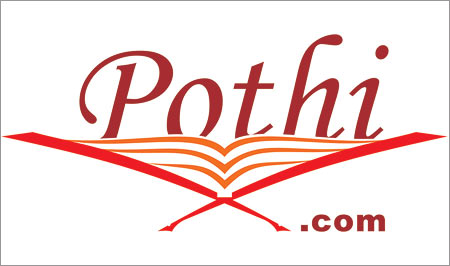
Meet Jaya Jha and Abhaya Agarwal, who opted out of the corporate rat race to start something out of the box.
Jha and her IIT classmate and a Carnegie Mellon alumnus Abhaya Agarwal, are founders of pothi.com, a print on demand facility designed to help you publish your original work.
Print on demand or POD is a relatively new concept in India, but the world over, it is set to redefine the way the publishing industry functions. Simply put, POD is a technique that helps you publish anything -- a book, brochure, graphic novel or a collection of poems. You have the freedom to print as many or as few copies you want, and circulate it privately or in the public domain. Since each copy/ title is printed only against an order, there are no inventories. That makes it a cost effective way of getting published and read.
Based out of Bangalore, pothi.com uses a model similar to that of lulu or amazon's CreateSpace. Using POD for self-publishing is a relatively new concept in India, but is catching on fast as it is especially useful to those who find traditional and mainstream publishing outfits inaccessible.
Barely a year old, pothi, like most creative concepts, was born in a desperate moment to break free from convention.
The genesis of the idea
Jaya Jha, an IIT Kanpur and IIM Lucknow graduate, was in a high-profile job with an international search engine. But she was caught in the classic conflict between the head and the heart.
"One fine day, like many people in my position, I was frustrated with everything around me -- particularly in the professional life -- and was wondering what am I doing with my life? Should I not be doing something meaningful?" Jha wanted to publish a book of poems.
"I realised publishing is not a medium accessible to all. It was not about becoming a bestseller for me. If I could reach out to only those ten loyal readers of my blog that was good enough."
Jha's hunt for a publishing medium led her to explore the options of self-publication. "There weren't any in India at that time. The entrepreneurial bug was there in me since my days at IIT Kanpur. This seemed like the right thing to do, where passion and profession could meet," says Jha.
Jha discussed the idea with her IIT classmate Abhaya Agarwal, who was at the Carnegie Mellon University at that time doing his PhD. "He was onboard with it. Then we spent next several months trying to figure out the operational details and finally took the plunge."
Agarwal today is the technical head at pothi, responsible for all the features of the Web site and implementing automation of back end activities, while Jha looks after the operations and business aspects.

But they did a lot of research on the operations aspect, though the business partners insist they learnt a lot more after getting started. Moreover, the project was entirely self-funded with friends and family too pitching in.
Pothi did face considerable operational hiccups. "Most of the vendors did not understand why we would want to produce one copy of a book," says Jha. Fulfilling the first few orders, when they were sparse, was each a challenge in itself. "We made some goof-ups, but had some patient customers thankfully. We have come a long way since then," she says.
Jha has quite a few grievances as well.
"Despite all the talks about encouraging entrepreneurship, several things in ecosystem are just not set up for small guys." Among the challenges were getting an Indian payment gateway in place (paypal does not support Indian rupee), e-commerce friendly shipping provider. "But we are still making headway," she says.

Jha explains, "It is not always about creating a big bang, about becoming a bestseller. Many people have more modest expectations and are happy to reach out to people around them. Without POD, the problem was that they'd have to print 500 copies, even if they wanted to reach out to only 50 of them. With POD that problem goes away."
Pothi uses social media (blogs, social networks), online advertising and marketing, search engine and book databases to market the titles. Besides publishing and marketing, it also offers editing, cover designing and brand/ image building (for those interested in creating a website/ blog etc) services as a part of their various packages.
A lot of the editing, designing, typesetting, translating and indexing work are outsourced to freelancers, while most of the communication with clients and service providers happens online. The result? Turnaround time is cut down, as are operational costs. Guess this is where all the B-school experience comes in handy.
The story so far
Jha and Agarwal claim they have managed to publish more than 90 self-publishing authors in less than a year's time and have made more than 120 titles available through POD. While most of these titles are available through pothi's online store, the rest were done for private circulation and distribution through other channels.
A cursory look at the Web site does reveals an exhaustive catalogue covering everything from fiction to films, magazines to academic books by professionals, amateurs and the aspiring.
Perhaps the biggest challenge to pothi's success is the mindset of the publishing industry and the average reader that still judges a title by its publisher.
But pothi's founders are willing to wait for the change to kick in.
Explains Agarwal, "It will take time before people traditionally in the publishing industry accept it wholeheartedly. The way we see it shaping up is not as a replacement to the conventional ways of doing publishing (bulk printing and distribution), but as complementing it. With POD each book could be customised and personalised, data can be mixed and matched to create books and no book ever needs to go out of print. So, while we are prepared that it will take time, we clearly see a space for POD, which it is destined to take."